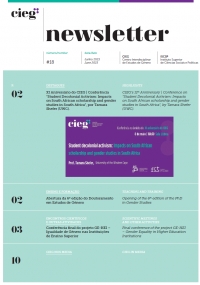A cocoordenadora do CIEG, Paula Campos Pinto, em colaboração com Marcia H. Rioux e Gillian Parekh, editou a obra "Disability, Rights Monitoring, and Social Change: Building Power out of Evidence", publicada pela Canadian Scholars’ Press.
Trata-se de uma obra que explora e desafia o modo com que os direitos das pessoas com deficiência estão a ser monitorizados, após a Convenção das Nações Unidas sobre os Direitos das Pessoas com Deficiência em 2006.
Os capítulos abordam as atuais questões teóricas, metodologicas e práticas em torno da monitorização dos direitos dos deficientes, e oferecem uma visão detalhada das leis e reformas políticas, boas práticas e métodos holisticos.
Mais informações aqui.
Índice da obra:
Acknowledgements
Introduction: A North–South Dialogue on Participatory Monitoring, Marcia H. Rioux
Background: Monitoring–A Key Element in Realizing Human Rights for All, Bengt Lindqvist
SECTION 1: MODELS OF MONITORING: INTERNATIONAL PERSPECTIVES
Chapter 1: Concurrent Multinational Monitoring of Disability Rights in the European Union: Potential, Principle, and Pragmatism, Anna Lawson and Mark Priestley
Chapter 2: The Preparation of a Parallel Report on the CRPD: The Philippine Experience, Lauro L. Purcil, Jr.
Chapter 3: Reflections on the First Working Period of the United Nations Committee on the Rights of Persons with Disabilities (2009–2012), María Soledad Cisternas Reyes
Chapter 4: Monitoring Gender Equality and Violence in Conditions of Structural Inequality and Violence, Annie Bunting
SECTION 2: NEW FRONTIERS ON MONITORING
Chapter 5: Bringing Pieces Together: A Way of Integrating Disability Rights Monitoring Data: Case Studies from Two Canadian Provinces, Ontario and Quebec, Mihaela Dinca-Panaitescu
Chapter 6: Human Rights Legal Clinics in Latin America: Tackling the Implementation of Disability Rights, Natalia Angel-Cabo
Chapter 7: Media Monitoring from a Disability Rights Perspective: A Critical Piece in the Rights Monitoring Project, Gillian Parekh, Jessica Vorstermans, and Paula Hearn
Chapter 8: Monitoring Individual Experiences: An Innovative Strategy to Initiate Social Change in the Exercise of Human Rights by Persons with Disabilities?, Normand Boucher and David Fiset
SECTION 3: MONITORING LAWS, POLICIES, AND PROGRAMS
Chapter 9: Disability-based Discrimination in India, Kalpana Kannabiran
Chapter 10: Effective and Equal Enjoyment of all Human Rights and Fundamental Freedoms by Persons with Disabilities in New Zealand, Petra Butler
Chapter 11: Canada Tracks Disability Rights: Using a DRPI Model of Systemic Monitoring to Highlight Law and Policy Impacting Disability, Roxanne Mykitiuk and Yvonne Peters
Chapter 12: Federalism, Decentralization, and Human Rights: Level of Implementation of the CRPD in Developing Countries: Lessons from Latin America, José M. Viera
SECTION 4: DIVERSE VOICES
Chapter 13: Disability Rights, Development, and the Roles of the Disability Movement from the International to the Grassroots, Samuel Kabue
Chapter 14: Hopes and Dilemmas of Africans with Disabilities: The Monitoring of Regional Disability Rights in Africa, Futsum Abbay
Chapter 15: Marginalizing the Subaltern Within: How to Effectively Engage with and Monitor Diverse Cultural Identities with Disabilities when Individual Identity Dominates the Collective Identity Framework, Huhana Hickey
Chapter 16: Securing the Full Participation of Persons with Disabilities and Their Representative Organizations in Disability Rights Monitoring, Rita M. Samson
Chapter 17: User/Survivor Monitoring Within the DPO Movement, Moosa Salie
Chapter 18: Monitoring Social Services for Persons with Disabilities in the Socioeconomic Context of Eastern Europe as a Tool for Enhancing Social Inclusion, Radoš Keravica
Conclusion: Debating Disability Rights Monitoring: Strengths, Weaknesses, and the Challenges Ahead, Paula C. Pinto
Contributors


